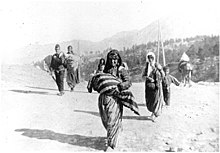
During World War I, Germany was a military ally of the Ottoman Empire, which perpetrated the Armenian genocide. Many Germans present in eastern and southern Anatolia witnessed the genocide, but censorship and self-censorship hampered these reports, while German newspapers reported Ottoman denials of the genocide. Approximately 800 officers and 25,000 soldiers of the Imperial German Army were sent to the Middle Eastern theatre of World War I to fight alongside the Ottoman Army, with German commanders serving in the Ottoman high command and general staff. It is known that individual German military advisors signed some of the orders that led to Ottoman deportations of Armenians, a major component of the genocide.[1][2][3][4]
Although many individual Germans tried to publicize the Armenians' fate in defiance of wartime censorship or to save as many lives as possible, the German Foreign Office and Ministry of War have both been harshly criticized for "extreme moral indifference" to the plight of Armenians and not doing more to stop the genocide.[5] In 2016, the Bundestag apologized for Germany's "inglorious role" in a resolution recognizing the genocide.[6]
- ^ ""Sie mussten sich auskleiden und wurden sämtlich niedergemacht"". Der Spiegel. 2 June 2016. Retrieved 4 January 2022.
- ^ "Das Deutsche Reich und seine Verstrickung in den Völkermord an den Armeniern". Haypress. 1 April 2012. Retrieved 4 January 2022.
- ^ "Der Tod in deutschem Interesse". Die Tageszeitung. 24 April 2012. Retrieved 4 January 2022.
- ^ Wolfgang Gust: Der Völkermord an den Armeniern 1915/16. Dokumente aus dem Politischen Archiv des deutschen Auswärtigen Amtes. 1915-11-18-DE-001. Armenocide. Retrieved 3 January 2022.
- ^ Hosfeld 2016, p. 247.
- ^ Cite error: The named reference
resolutionwas invoked but never defined (see the help page).